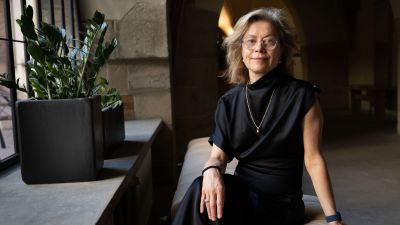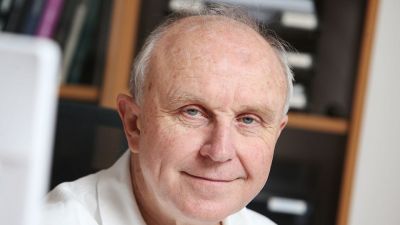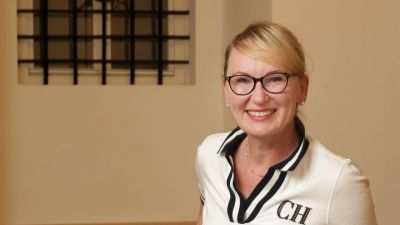The only certainty in our lives is its end. Yet we avoid the subject of dying, we try to postpone it. “Palliative care is not just about the end of life. It is about living well for as long as possible, despite a serious illness,” says Martin Loučka, psychologist, director of the Centre for Palliative Care and assistant professor at the Third Faculty of Medicine at Charles University, who has been working for the last decade to bring about a systemic change in the care of the dying: through research, teaching, and even a conversational card game.
What are the biggest myths about palliative care?
That it's about the very end of life, when there's nothing more that can be done. So-called early integrated palliative care is about living well for as long as possible, in the face of a serious illness, and it needs to be talked about early – at the point when you know you have a terminal illness that is going to get worse. It is good to start thinking about what you still want to do, what your wishes are, what you want to do when the situation starts to get worse. If these topics are left until the very end, there may not be enough time or strength left. What always bothers me the most is the phrase: “Why didn't you tell me before, they told me it would be fine. I don't have the strength anymore, but I'd like to do this and that...”
How should one react when someone close to us says: "I'm really sick, it looks bad"?
Be authentic! “That's terrible, I don't know what to say. What can I do for you?” And then listen. If a loved one told me he or she is dying, I would probably feel shock, sadness, uncertainty, and feel the need to talk to that person about it. Patients often share with us that they really appreciate it when you act normal, ask questions, and offer to help – like bring groceries or cut the grass in the garden. At the same time, don't take it personally that they may not want to see you sometimes because they are too tired.
How did you get into the subject of palliative care in the first place?
I don't have a heartbreaking story of my grandmother dying and me struggling with the system. Palliative care appealed to me during my undergraduate studies because as a field it makes a huge amount of sense to me – you go to sleep at night knowing you're doing something useful and necessary; you're actually helping people. At the same time, I also see a huge potential for change here.
 What is the hardest part of your job?
What is the hardest part of your job?
I would dare to say that working in palliative care itself is no harder than any other job. However, one should think carefully about whether it is something that makes sense to them and that they want to and can fulfil themselves in. For some people, the subject of death is so frightening to the point of paralysis that the mere mention of it changes the topic of conversation to “let's talk about football instead”. From what I have had the chance to know, there are people working in palliative care who find it fulfilling. For me, it's a beautiful job where you're helping people, doing great things for them at important moments. Plus palliative teams have very good supervision, they care a lot, they know how to share the weight of the work and emotions with colleagues. The demotivating factor is usually the low financial remuneration or the administration involved, but not the work itself.
How does palliative care in the Czech Republic compare to the rest of the world?
It has several levels. I will start with what is good. We have very good in-patient hospices in the Czech Republic, and there are quite a lot of them. However, until recently, their problem was that they existed in a kind of "grey zone" outside the system, where even the doctors themselves often had distorted ideas about their functioning. Fortunately, this is beginning to change and the idea of a "church dispensary" is being abandoned. The system of home care is also changing positively, with insurance companies now contributing to it, and the number of organisations providing the necessary help is also growing – so-called mobile hospices. However, there is an interesting paradox here. According to surveys, most people would like to die at home. However, practice shows that when people get into this situation and actually experience all the complications associated with the illness, the location does not play such a big role. Above all, they want good care and are concerned that their illness will not be too much of a burden on their family.
Where are we lagging behind?
In the overall concept of palliative care. In Western countries, every major hospital has a palliative care programme and palliative care is regarded as a standard discipline and an integral part of medical training. In our country, everything is still in its infancy and we are 10 to 15 years behind. But this can also be a huge advantage for us, because we can easily learn from the experience of others and choose the best strategies. We just need to find the will to change and decide that this is our priority now.
|
Tell me. A game that helps What are the first three words that come to mind when you hear the word "hospice"? How old were you when you first realised you were going to die someday? If you found out you had a terminal illness, who would you go to for advice? These are three questions from the conversational card game Tell Me: A Game for Life and Dying Well, brought to the Czech Republic by Martin Loučka. “Most people have ideas about the end of their lives, but few people tell anyone about it. This game can help,” he says. Feedback shows that the game is played by young and old, family and friends. “I think the key to success is setting your own boundaries of what you want to share,” says Loučka. So far, he hasn't had any negative reactions. “Others appreciate that it actually calmed them down to hear that others are also thinking about it, maybe they don't know, or they see it in a similar way." www.reknimi.cz |
You yourself work intensively on changing medical education. Your block courses on palliative care and communication of serious messages to patients are highly praised by students at the Third Faculty of Medicine of Charles University.
I am most pleased about that. Moreover, when I meet the students after a few years, they say that this course helps them a lot in practice. But compared to foreign universities, we have a lot of catching up to do: every medical student here still learns childbirth even though only a small proportion of them will give birth, but the majority will communicate serious news or care for seriously ill patients. Palliative care in our country is still not a common part of the state or compulsory training, the field itself is becoming established. But even here I am optimistic and see efforts to change – the furthest along in terms of implementing palliative care into the curriculum, in my opinion, is at Masaryk University, where they already have mandatory pre-state practice. At the same time, in May, together with the Czech Society of Palliative Medicine ČLS JEP and the Kladné Nuly Foundation, we launched a project involving all medical faculties in the Czech Republic, which will jointly develop the teaching of palliative medicine.
You like to emphasise that palliative care is not just about “ having your heart in the right place”, but that it is a science like any other and that decisions need to be made on the basis of data...
This was one of the reasons I founded the Centre for Palliative Care: I felt that an academic approach to the subject was lacking in our country. You can't convince insurance companies, doctors or hospital operators just with touching letters from families. They want numbers. In addition to our own research, for example, we run workshops for hospice and hospital staff so that they can evaluate their work and describe the effects "in the same language" as other clinical disciplines.
Can you give an overview of your projects?
For example, we have specifically looked at how patients with serious illness understand their prognosis and what influences this. Why is it that even when a patient learns from their doctor that they only have a few months to live, they still plan a winter vacation for next year. Or how often it happens that a patient leaves the hospital after unsuccessful treatment "informed" but with the mistaken feeling that it's actually fine, that he won't have to have chemotherapy now so "he won't be so sick" and can go to the mountains. They then often understand their condition too late, when they have no strength left.
Our current focus is on how hope relates to this. We often hear from doctors,“Don't tell patients how well they are, how much time they have, because you take away all their hope, and then they won't want to cooperate with treatment”. However, according to preliminary data from abroad, this may not be entirely true. Indeed, it seems that hope is simply a natural defence mechanism that patients have and that can be encouraged even when they have true and complete information about their illness.
Does palliative care have any research specifics?
Perhaps only that it fully meets the current scientific trend towards interdisciplinary collaboration, as it inherently involves psychosocial, spiritual, clinical, as well as technological or economic aspects of quality of life. People also sometimes wonder whether it is ethical to bother patients with end-of-life research. However, we also know from our own data that patients mostly see it as a positive experience – and they do not mind participating in research.
|
The Palliative Care Centre was founded by Martin Loučka in 2014 with the aim of systematically improving care for the dying in the Czech Republic. The Centre conducts research, the results of which are the basis for systemic and legislative measures to improve care for dying patients across the entire health and social care system. The centre is also dedicated to education, communication and information provision among professionals and the general public. |
How do you view the use of modern technology in palliative care?
It is a tool that has great potential and I am convinced that we will use technology more and more, not only in palliative care. Covid has already given us many opportunities to try it out, at least at the level of remote communication. Of course, there is no substitute for face-to-face contact, but sometimes it is not possible and online communication is better than no communication. Remote symptom monitoring is also a big issue – why "drag" a patient to hospital at the very end of life for tests that are important but in the overall context do not help, only unnecessarily exhaust them.
What are other trends?
In palliative care, for example, the use of virtual reality (VR) is being tested for pain relief. Dr Lucie Hrdličková from Motol University Hospital and her husband are working on using VR in teaching communication for medics. I see huge potential in this. Today, there is a lot of talk about artificial intelligence, and even in palliative care there are works that use AI and "big data" – for example, to assess the risk of early death based on hospital history and symptoms. At the same time, whenever we talk about technological "gadgets", I cannot help but make a comment about the current healthcare system. When my daughter broke her arm last summer, she had an x-ray at a regional hospital and the images were burned onto a CD for us, but the hospital in Prague couldn't read them and the whole exam had to be repeated! So, yes, there are already all sorts of wonderful technologies, but their common use is hampered by the gap of lived reality.
You have worked at a number of foreign institutions, Columbia, Harvard, and you continue to work internationally. What would you like to "transfer" to the Czech environment?
A change of mindset. To have vision and support each other! For example, last year I received a job offer from the University of Pittsburgh, which I turned down for personal reasons, but the course has stayed with me deeply. They invited me to come and take a look. I had about 15 meetings with the administration and my colleagues over the course of two days, and their first question was always, “What are your visions and dreams and what can we do for you, can we be of any help?” And they're really interested in your answer and thinking in context. Like the head of the clinic immediately asked: “And what does your wife do? We could help her find a job.” I've never experienced this level of support in the Czech Republic.
Even their presentations start like this: “We want to be the best medical school in the U. S. in five years, this is our plan and next steps...” I see an effort to improve things at our university, but in general, I think our academic community is less courageous, transparent and a little bit cursed by some of the processes that go on and on. However, I believe things are improving and will continue to improve.
| Martin Loučka, Ph. D. |
| Martin Loučka is the director of the Centre for Palliative Care, a psychologist at the Thomayer Hospital in Prague and an assistant professor at the Department of Medical Psychology at the Third Faculty of Medicine, Charles University. He graduated in psychology at Masaryk University, then went on to complete a doctoral programme in palliative care at Lancaster University in England. Thanks to a Fulbright scholarship he worked at the Icahn School of Medicine in New York. He completed an internship at the VU Medical Center in Amsterdam, a course in working with complicated grief at Columbia University, a palliative program at Harvard Medical School, and comprehensive training in Gestalt therapy at the Dialogue Institute. He has already received numerous awards for his work in advancing palliative care. |























